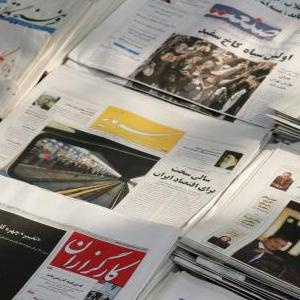Tehran's Daily Newspaper Review

The front page of Iranian newspapers was reserved for International Quds Day, the last Friday of Ramadan, when across the Muslim World demonstrators march in support of the Palestinian cause. Ayatollah Khamenei’s remarks in meeting with the academe also appeared on the front page of newspapers.
“Attending the Quds Day rally means preservation of the Revolution’s achievements,” Iran quoted the Supreme Leader. Ayatollah Khamenei added that foreign media “pump” a heavy load of skewed data and “poisonous” analyses which can affect the academe and the seminaries if they don’t have access to correct information. He also advised officials not to take criticisms of the elite as opposition to the Nezam. Iran also carried out a report on “ID-less websites roaming cyberspace”, citing Minister of Culture officials plan to draft a guideline to organize the news websites. In the newspaper’s editorial, Abd-or-Reza Soltani praised Ahmadinejad's policy towards Israel and his criticism of the “Holocaust myth”. The writer also argued that the massive turnout of Iranians in the Quds Day rally could serve as a message to Middle Eastern nations that “their model”, i.e. the Islamic Republic, “moves forward toward the peaks of progress.”
Jomhouri-ye Eslami predicted a more enthusiastic Quds Day as the region is under dramatic transformation and the Arab dictators are falling. The media have “confessed” a change of balance in favor of the Muslim nations in their confrontation with the Zionist Regime, Jomhouri-ye Eslami reported. “Universities are home to scientific progress and the glorious resistance of the Iranian nation,” the newspaper quoted Ayatollah Khamenei.
From Ayatollah Khamenei’s speech, Kayhan chose to highlight his warning about the enemy’s plot to “de-religionize” and “de-academize’ the universities. The newspaper chose a rather poetic headline for Quds Day: “The cry of Quds’ liberation in the Spring of Islamic Awakening”. In Kayhan’s editorial, Mohammad Imani claimed that the “No Gaza, No Lebanon” slogan chanted by Green Movement supporters in 2009 infuriated millions of Iranians, as well as the Muslim nations of Egypt, Bahrain, Yemen and Palestine, and inspired their Arab Spring.
Resalat quoted Ayatollah Mahdavi Kani, Head of the Assembly of Experts and conservatives’ spiritual leader, who is busy these days with a campaign to form a united front of Principlists for the upcoming parliamentary elections, as saying that “if Principlists unite, they will certainly win and we will witness a revolutionary parliament.” Resalat’s editorial focused on Israel's rough days as the Arab dictators-- Mossad’s agents according to the piece-- have been overthrown. The biggest message of this year’s Quds Day is “materialization of Israel's decline,” according to the editorial.
Also related to the subject, Reformist Shargh’s top headline was a bit different. The newspaper focused on Akbar Hashemi Rafsanjani’s call to “avoid coarse remarks when fighting with the Zionist Regime”. Most likely, the ayatollah had Ahmadinejad's “the myth of Holocaust” in mind when making that comment. Iran has not had an active presence in the course of the Islamic Awakening, the newspaper cited Ayatollah Hashemi Shahroudi, former head of the Judiciary.
Less than one week after Haj Mansour Arzi, a well-known maddah (1) of Tehran, sniped at Ahmadinejad's Chief of Staff Esfandiar Rahim Mashaei during a religious ceremony, Tehran-e Emrooz quoted the President’s legal deputy about the government’s decision to sue Arzi, once an avid supporter of the president who endorsed Mahmoud Ahmadinejad and promoted his candidacy among the religious strands of society in both the 2005 and 2009 presidential elections. The newspaper’s editorial concerned Quds Day. “The Israeli regime cannot evade the aftershock of the Arab revolutions,” Hesammedin Kaveh wrote, adding that Arabs will eventually focus on the Palestinian problem once they’re done with fixing the affairs in their own countries.
(1) Maddah which can be literally translated as ‘tributer’ or ‘praiser’ is an individual who chants hymns during mourning rituals for the Shi’a imams, or on similar religious occasions. A number of Iranian maddahs, such as Mansour Arzi, have gained notable reputations and influence in recent years.
* Note: Vatan-e Emrooz does not publish on Thursdays.
Trouble with understanding some terms? Check our Glossary of Iranian Political Terms.
Briefing
Hamshahri (Citizen) is the official daily newspaper of Tehran's Municipality. Its general directions in politics, culture and economy are determined by the mayor of Tehran, currently Mohammad Baqer Qalibaf.
Iran is the official organ of the administration.
Jomhouri-ye Eslami (The Islamic Republic) was known as the official organ of the Party of the Islamic Republic, founded in 1979 and disbanded in 1987. Currently, it is an open critique of Mahmoud Ahmadinejad's policies and is known to be a mouthpiece of Akbar Hashemi Rafsanjani.
Kayhan (Universe) is a hard-line conservative newspaper. Its editor-in-chief –currently Hossein Shari’atmadari- is appointed by Iran's Supreme Leader. Shari’atmadari’s editorials often spark off controversy and debate inside Iranian political circles.
Khabar (News) is a principlist daily newspaper which adopts a critical stance towards Ahmadinejad's policies.
Resalat (Mission) belongs to the moderate wing of the principlist camp. Resalat’s best known analyst is Amir Mohebbian, its political editor.
Shargh (East) is a moderate reformist newspaper. It was the most popular and influential reformist newspaper in its first period of publication which lasted from August 2003 until September 2006.
Tehran-e Emrooz (Tehran Today) is a ‘principlist reformist’ newspaper, connected to Mohammad Baqer Qalibaf.
Vatan-e Emrooz (Motherland Today) -which started its publication in November 2008-, belongs to Mehrdad Bazrpash, the thirty-old pro-Ahmadinejad politician who is also head of Iran's second largest auto manufacturer company, Saipa. Vatan-e Emrooz is a supporter of the president’s policies.

